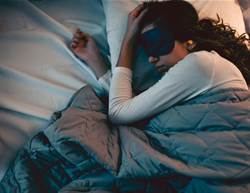As COVID-19 vaccinations roll out in the US and UK, with Australia expected to join the program in March, experts have confirmed face masks will still need to be worn to keep the virus at bay.
Dr Anthony Fauci, the leading infectious disease expert in the US, told CNN in November that “it’s not going to be a light switch” back to pre-pandemic days.
“I would recommend to people to not abandon all public health measures just because you have been vaccinated,” he said. This includes wearing a face mask, social distancing, staying out of large crowds, and washing your hands thoroughly and frequently.
The Centers for Disease Control and Prevention (CDC) also states on its website that “the combination of getting vaccinated and following recommendations to protect yourself and others will offer the best protection from COVID-19”.
Here’s why wearing a face mask will still be crucial as vaccinations continue into 2021, according to doctors.
The COVID-19 vaccine doesn’t provide 100% protection
While data released from Pfizer and Moderna—which have both been granted FDA Emergency Use Authorisation in the US for their respective vaccines—show that the vaccines are more than 90% effective, they don’t provide 100% protection from COVID-19.
Pfizer shared in early November that its two-dose vaccine was more than 90% effective in keeping 43,538 people in phase 3 clinical trials safe from COVID-19 infection. According to data from Moderna’s clinical trial, known as the COVE study, the company’s vaccine was 94.5% effective at preventing COVID-19 infection in those who received two doses, with more than 30,000 people in the US enrolled in the trial.
But even with the slim chance of mild illness, “the vaccine will likely make COVID-19 infections less severe” should you get sick, says Dr Richard Watkins, infectious disease physician and professor of internal medicine at the Northeast Ohio Medical University.
It’s also rare for any vaccine to have 100% efficacy. The measles, mumps, and rubella virus vaccine (MMR vaccine), for example, is 97% effective at preventing measles, but it’s still considered highly effective. In fact, measles was declared “eliminated” from the US in 2000, meaning it was absent of continuous transmission for more than a year, per the CDC. (Recent outbreaks were among groups of people who were not vaccinated.)
The COVID-19 vaccines are considered highly effective, but until the pandemic is under control and public health officials have enough research to say otherwise, you’ll still need to wear masks in public spaces to help reduce the spread of the virus and its impact on our healthcare system, Dr Watkins says.
Doses of the COVID-19 vaccine are in limited supply
Pfizer says that it should be able to make up to 1.3 billion doses of its vaccine in 2021, while Moderna has confirmed it can produce 500 million to 1 billion doses globally this year.
Since each person needs to get two doses of these vaccines, the number of people who can actually be vaccinated is about half that number, points out Dr Thomas Russo, professor and chief of infectious disease at the University at Buffalo in New York.
“People who have been vaccinated will be recommended to wear masks until at least the public health emergency is somewhat behind us,” says infectious disease expert Dr Amesh A. Adalja, senior scholar at the Johns Hopkins Center for Health Security.
It takes time for the vaccine to kick in
Each vaccine requires two shots, spaced several weeks apart. (Pfizer’s vaccine is given three weeks apart; Moderna’s vaccine is given 28 days apart.)
“For maximum protection, you need to get both shots,” Dr Russo says. The first shot helps your body recognise the virus and primes your immune system for it, he explains. The second shot makes that immune response stronger.
“Protection from a vaccine doesn’t happen instantly,” Dr Russo says. In general, you can expect to reach the ideal level of immunity five to six weeks after your first shot, provided you receive both injections.
Asymptomatic COVID-19 spread is still a huge issue
Research suggests that approximately up to 50% of COVID-19 transmission is due to people who are infected but have no symptoms of the virus.
Detailed data has not been released yet on whether the vaccines offer what’s known as sterilising immunity, in which those who are vaccinated can’t contract or pass on the virus at all. Until more research is done, there’s a possibility that people who are vaccinated can still become infected without symptoms and spread the coronavirus to those who have net yet received the vaccine.
That’s important to keep in mind, Dr Russo says. “If you could possibly be infectious to others, it’s prudent for people to wear masks so they don’t serve as a vector,” he says.
Australia's free vaccine roll-out
Minister for Health Greg Hunt has told the Daily Telegraph that 80,000 doses a week of the Pfizer vaccine are set to arrive in Australia each week from later this month, and says the campaign will begin in early March.
The Australian Government has also secured 53.8million doses of the AstraZeneca COVID-19 vaccine – enough for the entire Australian population.
Also, 51 million doses of the Novavax vaccine have been purchased. This will be an additional whole-of-population vaccine should it be proven to be safe and effective.
Health and aged care workers will be the first to be vaccinated, along with elderly Australians who are at most risk from the virus.
“The vaccines will be voluntary and free, we encourage people to have the vaccine to protect themselves and their family,” Hunt said.
Bottom line: face masks will be needed until COVID-19 cases become nearly nonexistent
There are several things doctors don’t know yet about what levels of protection the COVID-19 vaccine provides. More data will be available as vaccines continue to be distributed.
“We may see mask guidance change after enough people have been vaccinated and this is no longer a public health issue,” Dr Adalja says.






.png&h=193&w=250&c=1&s=1)
.png&h=193&w=250&c=1&s=1)

